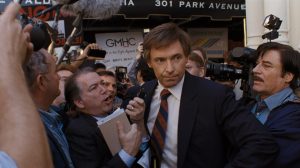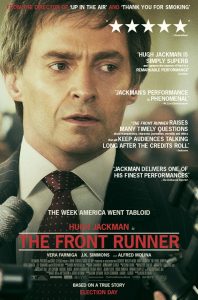“The Front Runner” (2018). Cast: Hugh Jackman, Vera Farmiga, J.K. Simmons, Alfred Molina, Sara Paxton, Kaitlyn Dever, Mamoudou Athie, Steve Zissis, Mark O’Brien, Chris Coy, Molly Ephraim, Alex Karpovsky, Oliver Cooper, Ari Graynor, John Bedford Lloyd, Spencer Garrett, Bill Burr, Kevin Pollak, Nyasha Hatendi. Archive Footage: Walter Mondale, Tom Brokaw, Jane Pauley, Johnny Carson, Ted Koppel. Director: Jason Reitman. Screenplay: Matt Bai, Jay Caron and Jason Reitman. Book: Matt Bai, All the Truth Is Out. Web site. Trailer.
Realizing our best intentions is a noble goal that many of us would like to see happen. Being able to be of service to others can be both uplifting and fulfilling. But, in carrying out such plans (particularly those that will thrust us into the public spotlight), we had better have our ducks in a row. Loose ends, unresolved issues and poorly conceived indiscretions can all serve to undermine our efforts and thwart us from reaching our objectives, lessons learned the hard way by a once-promising politician in the new historical drama, “The Front Runner.”
Having been out of the White House since 1980, the Democratic Party was committed to recapturing the presidency in 1988. In the wake of candidate Walter Mondale’s sweeping defeat in 1984, the party was anxious to find a strong prospect, and, as the upcoming election approached, Democrats believed they found such a contender in Colorado Senator Gary Hart (Hugh Jackman). After coming close to winning the Democrats’ presidential nomination four years earlier, the young, idealistic legislator resolved to win the party’s mandate. And, as campaign season began, Hart was the clear front runner, significantly outpacing both Republican and Democratic rivals.
Hart was a breath of fresh air in a political system that had grown old and stale. His ideas were innovative and sought to implement progressive reforms that many saw as important to the country’s future. As a senator from Colorado, he represented the frontier spirit of the American West, a land of new opportunities and audacious thinking. He seemed to be just what the Democrats – and America – wanted. And, given his lead in the polls, it seemed as though there would be no stopping him. But, as events played out, his campaign lasted a mere three weeks.
What went wrong? That’s what this film seeks to identify, and the answers are not as simple and clear-cut as many have come to believe. In part, Hart’s failure came down to personal shortcomings. In part, his downfall can be attributed to the failings of the American political system. And, in part, it was linked to radical (and unfortunate) shifts in the practices of the mainstream media. Regardless of whichever element one gives the greatest weight, though, the bottom line in this is that they all collaborated to derail the candidacy of a politician who may have actually been able to bring meaningful change to a political system in need of reform, alterations that may have caused the course of history to follow a different path in the ensuing years.
[caption id="attachment_10324" align="aligncenter" width="300"] Colorado Senator Gary Hart (D) (Hugh Jackman), initially the leading candidate in the 1988 presidential campaign, gives an impassioned speech about his plans for the land’s highest office in director Jason Reitman’s latest offering, “The Front Runner.” Photo by Frank Masi SMPSP, © 2018 CTMG, Inc.[/caption]
Colorado Senator Gary Hart (D) (Hugh Jackman), initially the leading candidate in the 1988 presidential campaign, gives an impassioned speech about his plans for the land’s highest office in director Jason Reitman’s latest offering, “The Front Runner.” Photo by Frank Masi SMPSP, © 2018 CTMG, Inc.[/caption]
Where Hart himself is concerned, he became involved in a personal scandal that proved to be his undoing. Rumors of marital problems with his wife, Lee (Vera Farmiga), had been circulating for some time. Whispers about infidelity made the rounds, too, though hard evidence was absent. In response, the senator always downplayed and deflected these issues, claiming that his marriage was fine. As a staunch privacy advocate, he also asserted that his personal life was no one else’s business. But, as a public figure in general, and a presidential candidate in particular, he was now in a very visible fishbowl, and his belief that he could somehow keep the two aspects of his life separate was naïve at best.
While on a weekend break from his campaign, Hart made a trip to Miami for some R&R. And, while attending a party on a yacht ironically named Monkey Business, he met a beautiful young woman named Donna Rice (Sara Paxton) with whom he became romantically linked. Hart believed he was being discreet about this affair, but, with the press on his heels, it was difficult for him to conceal his actions. He even went so far in insisting that nothing was going on that he dared the media to put a tail on him. So, when reporters from The Miami Herald (Steve Zissis, Bill Burr, Nyasha Hatendi) did just that, and when others, such as those from The Washington Post (Mamoudou Athie), began asking hard questions, they came up with evidence of the senator’s indiscretions. And, when they revealed their findings (sloppy though some of the reporting was), the world pounced on the front runner.
Hart was blindsided by the oppressive attention, dumbstruck that anyone would be so interested in his personal life. He tried to disavow the allegations and to turn the conversation back to campaign issues, while his campaign manager (J.K. Simmons) sought to spin the message to repair his candidate’s image. But, no matter how hard he and his team tried to change the subject, journalists and Hart’s political rivals kept pressuring him about the Rice affair. Voters began to doubt his judgment and his ethics, and the ideals he claimed to stand for came into question. Such relentless harassment and burgeoning skepticism prompted Hart’s poll numbers to quickly plummet, and, after less than a month, he suspended his campaign, bringing to an abrupt end the promise he brought to the race only weeks earlier.
One could argue that Hart’s actions were his own undoing, that he engaged in an act of political self-sabotage. But a case could also be made that he was partly done in by a cynical political system that mercilessly pounced on a side issue that, in many regards, had nothing to do with how he would perform in office. Such tactics have become standard operating procedure ever since, a practice that’s highly questionable and, regrettably, entrenched.
Similar accusations could be made against a rabid media establishment so hungry for a juicy story that it gave little thought to the implications of what satisfying that appetite would do the country generally and to the candidate personally. The incessant hounding about a matter that had little bearing on Hart’s policies (and did nothing to inform the public about his platform) marked the beginning of a disturbing change in the nature of American media – the tabloidization of the press, which has since then increasingly skewed its perspective into the realm of irrelevancies and a loss of objectivity.
The failure of Hart’s campaign represents a tragic lost opportunity in the country’s history, setting us on a course that we have not been able to shake in the years since then. It’s also somewhat sadly ironic that the senator’s indiscretions at the time were seen as such an unforgivably immense moral failure, actions that, compared to the kinds of transgressions that have occurred in the decades since, seem almost tame in contrast. Would accusations like those leveled against Hart have the same implications today? Probably not. And, in some ways, it’s unfortunate that they were allowed to have such an impact when they did. Imagine what might have happened if the senator’s personal life indeed had been left to be his own business and that he had been successfully elected. If he had been allowed to assume office, one can’t help but wonder if we would we have the kind of America we have now.
[caption id="attachment_10325" align="aligncenter" width="300"] Faced with a fast-growing scandal, Colorado Senator Gary Hart (D) (Hugh Jackman, center) is swarmed by the press as he tries to salvage his 1988 presidential run in the new historical drama, “The Front Runner.” Photo by Frank Masi SMPSP, © 2018 CTMG, Inc.[/caption]
Faced with a fast-growing scandal, Colorado Senator Gary Hart (D) (Hugh Jackman, center) is swarmed by the press as he tries to salvage his 1988 presidential run in the new historical drama, “The Front Runner.” Photo by Frank Masi SMPSP, © 2018 CTMG, Inc.[/caption]
So how did all this come to pass? That’s where the conscious creation process comes into play, the philosophy that maintains we manifest the reality we experience through the power of our thoughts, beliefs and intents. In this case, though, it’s more precisely attributable to the un-conscious creation process, where our existence unfolds from beliefs of which we’re unaware or don’t fully understand, especially where the consequences are concerned.
Take, for instance, Hart’s personal situation. On the one hand, he wanted to be President. On the other hand, he wanted to indulge his romantic impulses. Considering that, it’s hard to fathom that there wouldn’t be any fallout for the first intended creation stemming from the fulfillment of the second. This is because, at his core, he apparently wanted to believe that he could have his cake and eat it, too, that he could continue to lead the unscrutinized life of a private citizen while in a high-profile, highly visible public position. His beliefs in creating both of these scenarios were based on un-conscious creation principles, undertakings focused on the results and not on whatever attendant outcomes may accompany them. Essentially he was faced with consequences that were incompatible with one another. And, in light of that, is it any wonder that he experienced the disappointing end game that he did, both in his political and private lives? The result is, sadly, self-sabotage, even though it arose unknowingly.
The same basic un-conscious creation principles that the senator tapped into individually were also accessed collectively by those in the political and media establishments. These acts of co-creation by default were collectively implemented to bring about the results they ushered in. Hart’s rivals for the presidency, for example, worked together to pounce on the candidate, using tactics that assured his demise, not realizing the long-term impact that such actions would have on the political landscape of the future. They helped to create – and establish – a form of politicking that has become the standard ever since. Did they intend to ruin Gary Hart alone, or did this practice represent a permanent change to be put into place? Even if it were only the former, the latter has been the result, something that they likely didn’t see coming. And, because of that, we now have the smear campaign electioneering that has become the norm.
Likewise, the methods employed by the media arose from reporters acting like pack animals seeking the fresh meat at any cost. Did they “just want the story,” or did they genuinely intend through their actions (and underlying un-conscious creation beliefs) to transform their profession into the tabloidized state it’s now in? Again, even if they didn’t seek the latter, that’s what we’ve now got thanks to how they brought this reality into existence.
In light of the foregoing, “The Front Runner” encourages us to take a look at these matters not only from a historical perspective, but also in contemporary terms, and, in both instances, we’re being asked to examine their underlying roots. Do we really want to continue dealing with the kinds of conditions in politics and the media that got their start during the Gary Hart campaign? What would it mean to get back to where things were prior to that turning point? In that sense, this film seeks to take on issues larger than just documenting the story of the senator from Colorado, and that’s certainly substantive food for thought.
However, as ambitions and well-intentioned as director Jason Reitman’s latest effort is, it struggles somewhat to pull it all together. Finding the right balance in both telling Hart’s story and addressing these big picture issues is a tricky undertaking, to say the least. The mix never quite gels as effectively as it could, and this lack of focus might leave some viewers wondering exactly what this movie is supposed to be all about. To its credit, the picture features fine performances by Jackman as the conflicted politician, Farmiga as the emotionally damaged wife and Simmons as the beleaguered campaign manager trying to salvage a lost cause that began with such hopeful optimism. It’s too bad that this release doesn’t quite live up to its hype – or its potential – given that, if handled more skillfully, it could have served as noteworthy social commentary that’s just as relevant today as it was about the period in question.
Shooting ourselves in the foot can carry many ramifications. In addition to being personally embarrassing or devastatingly hurtful, we run the risk of letting down others, ruining our expectations and theirs. Such acts of self-sabotage can be disastrous beyond what we can imagine, with implications that can have impact that’s both wide ranging and long tenured. This raises the importance of living up to our personal responsibility, making sure that we prepare for its implementation, as well as seeing it through. To do less runs the risk of regret, and, once that makes its presence felt, there may be little we can do to go back and rectify it. And what a terrible shame that would be.
Copyright © 2018, by Brent Marchant. All rights reserved.
Sunday, December 9, 2018
‘The Front Runner’ examines the perils of self-sabotage
Subscribe to:
Post Comments (Atom)

No comments:
Post a Comment